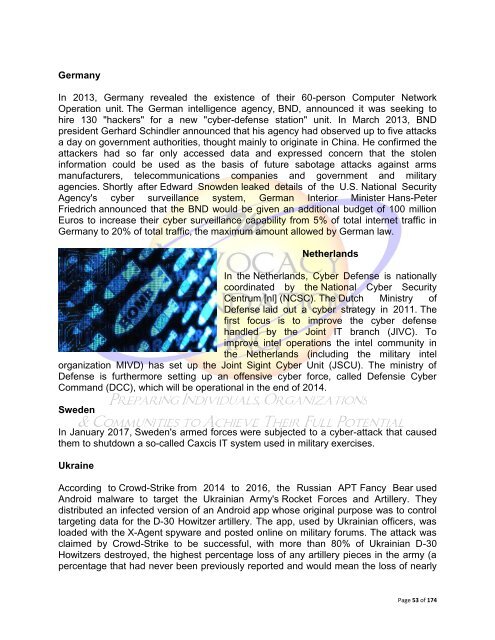International Cyber Terrorism
International Cyber Terrorism
International Cyber Terrorism
- No tags were found...
You also want an ePaper? Increase the reach of your titles
YUMPU automatically turns print PDFs into web optimized ePapers that Google loves.
Germany<br />
In 2013, Germany revealed the existence of their 60-person Computer Network<br />
Operation unit. The German intelligence agency, BND, announced it was seeking to<br />
hire 130 "hackers" for a new "cyber-defense station" unit. In March 2013, BND<br />
president Gerhard Schindler announced that his agency had observed up to five attacks<br />
a day on government authorities, thought mainly to originate in China. He confirmed the<br />
attackers had so far only accessed data and expressed concern that the stolen<br />
information could be used as the basis of future sabotage attacks against arms<br />
manufacturers, telecommunications companies and government and military<br />
agencies. Shortly after Edward Snowden leaked details of the U.S. National Security<br />
Agency's cyber surveillance system, German Interior Minister Hans-Peter<br />
Friedrich announced that the BND would be given an additional budget of 100 million<br />
Euros to increase their cyber surveillance capability from 5% of total internet traffic in<br />
Germany to 20% of total traffic, the maximum amount allowed by German law.<br />
Netherlands<br />
In the Netherlands, <strong>Cyber</strong> Defense is nationally<br />
coordinated by the National <strong>Cyber</strong> Security<br />
Centrum [nl] (NCSC). The Dutch Ministry of<br />
Defense laid out a cyber strategy in 2011. The<br />
first focus is to improve the cyber defense<br />
handled by the Joint IT branch (JIVC). To<br />
improve intel operations the intel community in<br />
the Netherlands (including the military intel<br />
organization MIVD) has set up the Joint Sigint <strong>Cyber</strong> Unit (JSCU). The ministry of<br />
Defense is furthermore setting up an offensive cyber force, called Defensie <strong>Cyber</strong><br />
Command (DCC), which will be operational in the end of 2014.<br />
Sweden<br />
In January 2017, Sweden's armed forces were subjected to a cyber-attack that caused<br />
them to shutdown a so-called Caxcis IT system used in military exercises.<br />
Ukraine<br />
According to Crowd-Strike from 2014 to 2016, the Russian APT Fancy Bear used<br />
Android malware to target the Ukrainian Army's Rocket Forces and Artillery. They<br />
distributed an infected version of an Android app whose original purpose was to control<br />
targeting data for the D-30 Howitzer artillery. The app, used by Ukrainian officers, was<br />
loaded with the X-Agent spyware and posted online on military forums. The attack was<br />
claimed by Crowd-Strike to be successful, with more than 80% of Ukrainian D-30<br />
Howitzers destroyed, the highest percentage loss of any artillery pieces in the army (a<br />
percentage that had never been previously reported and would mean the loss of nearly<br />
Page 53 of 174
















